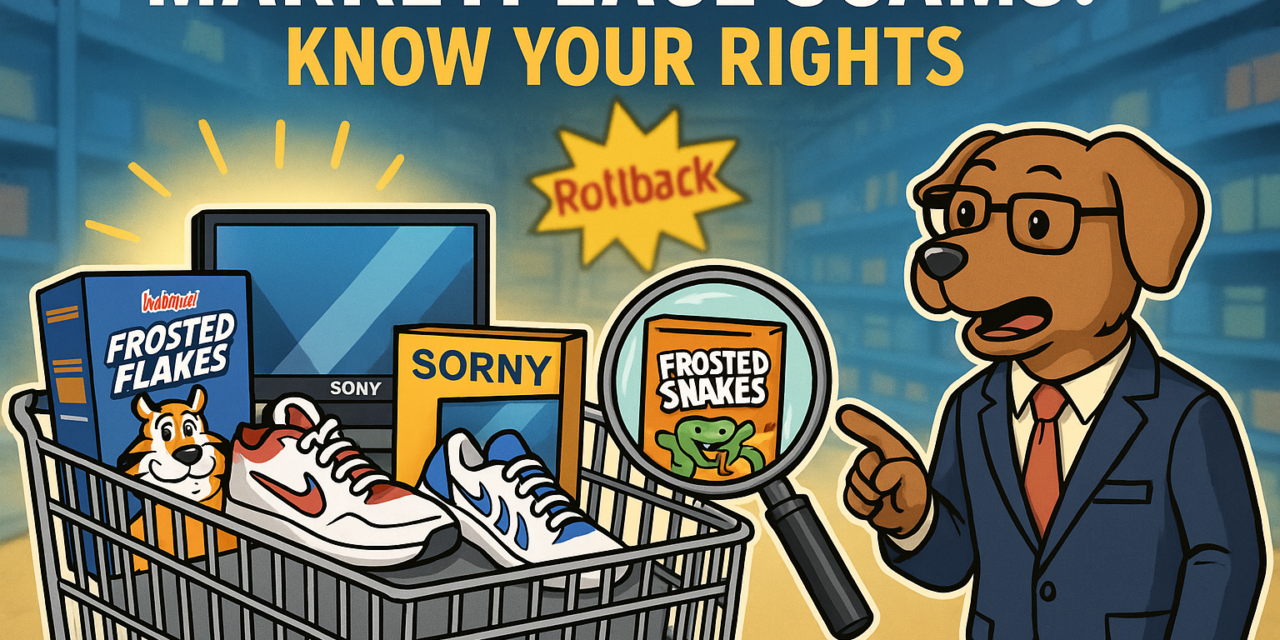A recent investigation has raised serious concerns about Walmart’s third-party marketplace: vendors impersonating other businesses, counterfeit goods being sold, and lax vetting that may put consumers and honest sellers at risk. For those of you who sell online, buy goods from online marketplaces, or worry about trademark or consumer‐protection law, this is a development worth paying attention to.
What the Investigation Found
According to reporting by CNBC (and followed up in outlets like PYMNTS):
-
At least 43 vendors on Walmart’s marketplace were identified as using the identity of other legitimate businesses when establishing seller accounts.
-
Sellers reported receiving returns of counterfeit items sold under the guise of someone else’s brand. One genuine business owner said customers had returned over a dozen counterfeit items that had been listed by a third party falsely posing as her company.
-
Walmart’s internal vetting process for approving third‐party sellers reportedly loosened in order to accelerate growth. One former Walmart employee alleged they were pressured to approve seller applications even if documentation or credentials were doubtful.
-
Walmart acknowledged some of these issues, emphasizing it’s taking action to remove “bad actors” and strengthen enforcement, though the scale of the issue, and how quickly policies can catch up, remains a concern.
Legal & Regulatory Implications
For those who sell products or buy them via online marketplaces, here are the kinds of legal issues this raises:
-
Trademark & Brand Infringement
If someone is impersonating your business, or selling goods falsely labeled as from your brand, you have cause to take legal action. Trademark law gives you rights to prevent others from misleading consumers. -
Consumer Protection / False Advertising
Selling counterfeit items, misrepresenting a product’s origin, or listing under another entity’s identity can violate consumer protection laws. State and federal statutes may come into play; regulatory agencies might also take interest. -
Liability of Marketplaces
While platforms like Walmart often claim they’re intermediaries, an investigation like this shows they may have liability if their policies are lax, especially if they knowingly allow bad actors on their platform. Courts and legislators are increasingly focusing on what “reasonable diligence” looks like. -
Contractual & Seller Rights
Legitimate sellers hurt by impersonation or counterfeit goods may have breach of contract claims or claims under unfair competition law. Sellers often enter into marketplace agreements promising protection from counterfeit or infringing products. If those promises are not enforced, there could be grounds for legal recourse. -
Regulatory Scrutiny & Enforcement
This kind of problem tends to attract attention from regulatory bodies. Enforcement could come from the FTC, state attorneys general, or other agencies focused on consumer safety, false labeling, import laws, etc.
What Consumers & Business Owners Can Do Now
If you’re either a seller or buyer, here are some practical steps:
-
Buyers should verify seller identity when possible: check seller ratings, reviews, photos, and return policies. Be especially cautious with high‐risk categories (luxury items, beauty/health products, electronics) where counterfeits are more common.
-
Sellers should ensure brand protection: register your trademarks, monitor your brand’s presence on marketplaces, document misuse or impersonation, and enforce your rights.
-
Legal Counsel can help draft and enforce marketplace agreements, assist with takedown requests, track counterfeiters, and consider litigation or regulatory complaints if harm is significant.
Why Pisanchyn Law Firm Can Help
At Pisanchyn Law Firm, we regularly work with clients on issues involving intellectual property, eCommerce disputes, false advertising, and consumer protection. If any of the following apply to you, you may want to consult with us:
-
Your brand is being impersonated or misused online.
-
You suspect counterfeit goods are being sold under your name or similar branding.
-
You are a seller harmed by lax marketplace enforcement.
-
You want to ensure your own contracts and policies protect you from marketplace risk.
What’s Next
The Walmart case is just one example of a broader trend: as online marketplaces grow, the pressure to balance fast growth with responsible vetting becomes more acute. We may see:
-
Stronger regulation or statute defining marketplace liability.
-
More lawsuits from brand owners and class actions from consumers.
-
Increased scrutiny of marketplace practices, both from government agencies and the public.
If you sell or buy on Walmart Marketplace—or any large online platform—it’s a good time to assess your risk exposure, tighten your protections, and make sure your rights are enforceable.





